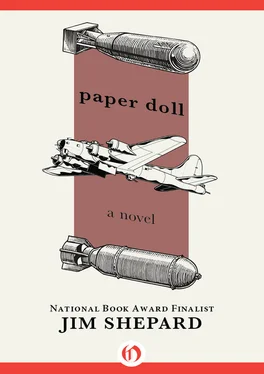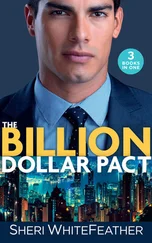“Jesus God,” Lewis said.
Piacenti tried to shuffle one-handed and spilled cards all over his lap. He said, “My mother said there was a thing in the paper back home that said that for a guy’s mother to wear the pin of the Air Forces is to tell everybody that she’s produced a son far above average mentally and physically.”
They were quiet again. A chair squeaked and he collected the cards into a messy pile.
“It’s true,” he said. “She clipped it out.”
Snowberry tossed Bombs Away back to Lewis. “We’re getting to be too negative,” he said. “They’re the ones on the run. We’re going after them in their backyard now. I read somewhere somebody said, Napoleon, I think, said that the logical end of defensive warfare is capitulation.” He repeated it. “I like that phrase,” he said.
“Napoleon was short of Focke Wulfs,” Lewis said.
Pissbag Martin stood and stretched and told them peevishly that he had to go. They could see he thought they were talking too much.
The card game broke up, and Piacenti and Eddy and Snowberry left with Martin. Stormy returned, disappointed that things hadn’t worked out and blaming himself, and turned off the projector lamp. He boxed the projector and pulled the tacks supporting the sheet screen.
While they watched him work, Lewis said, “My father worked as a porter out of Chicago for a few years. I ever tell you that? White porter.”
Bryant shook his head. “You told me you lived in Dayton,” he said.
“We did. He told me once they were coming into a station in Louisiana, bayou country, and it was completely dark. Woman was getting off alone. He’d estimate the station stop — a dirt road — and signal the conductor. He really wants to impress this woman, beautiful West Virginian. She’s oohing and aahing he can see anything at all in this pitch black. He waits and waits and then calls for the stop, and when he throws out the stepdown box, there’s this little splash, and then nothing. All they can see in the dark are these little bubbles.”
He laughed. “I always loved that story,” he said.
Stormy laughed too, distractedly, and gave them the word that something was on the next morning, folding the sheet apologetically and becoming more awkward at their lack of response, as they stayed where they were, each of them quiet and alone now in the darkened briefing room.
The next morning they were part of a forty-plane raid which was to join a larger force headed for Kiel. They had heard that RAF meteorologists were reporting the frequent lows that had covered northwestern Europe for the last two months were giving way to highs, and that Bomber Command intended to take advantage of the upcoming weather in a big way. Lewis had remarked grimly that they might have their next twenty-three missions in twenty-three days, it sounded like.
They never got to Kiel. They never got airborne. Whatever the lows or highs, whatever Stormy’s weak and maddening optimism, at 0600 the sun had not risen high enough to dispel the early morning ground mists, and the bombers ran up their engines one behind the other on the flight line with their olive tails rising above the mist like the dorsal fins of sharks. From his turret Bryant could intermittently see Quarterback , the plane ahead of them. Farther down the runway, the seventh aircraft in line had an engine fail during takeoff and went off the field and into the woods, through the perimeter hedge. The running lights on its tail winked through the fog. Crash trucks began rolling and the B-17’s in line behind became confused. The eighth ship, Miss Quachita , had already started its run, but stopped halfway down, Bryant learned later, having either heard the radio command to cease takeoff or having seen the red warning flares fired by Flying Control. Miss Quachita ’s pilot, a quiet boy from Birmingham, turned it around and brought it back up the runway. Coming down the runway full tilt was the ninth ship, Cheyenne Lady , with Dick Ott in the tail and Pissbag Martin in the nose as bombardier. It was carrying sixteen five-hundred-pound bombs stacked in columns in its mid-section and its throttles were wide open. They collided head on, and the detonation snapped Paper Doll two or three feet back on the hardstand, jerking Bryant violently around in his takeoff harness. Martin and Ott and eighteen others were killed instantly, and the pilot and co-pilot of the plane immediately following were savaged by their disintegrating windshield. The column of fire billowed up like an enormous flare, the burned-off mist haloing around it. The runway and its hardbase were torn apart and took five days and nights to repair.
Morale for those five days hit some sort of all-time low. Someone had reported finding a piece of Dick Ott’s flight jacket, where he had stenciled a small white parachute to commemorate the escape from the severed tail, and the crews found the irony hateful. Hirsch kept to himself more than ever. Bean continued to annoy them and now seemed distracted and morose. When he did speak, it was often to make lists for the listener of what he had just been doing. Lewis seemed to want nothing to do with any of them, Piacenti wrote long letters home he then destroyed, and Snowberry sat with his journal, rereading more than writing. They flew practice missions and sat through training sessions sullenly.
Bryant spent his free stretches watching repairs of the runway, or watching Audie sprint from the hedge to the information hut at the outer reaches of the airfield. The dog tirelessly ranged after low-swooping birds with smallish V-shaped tails and chocolate and orange markings. “What are those?” he called to Lewis. “Sparrows?” Lewis was sitting on some stacked rubber tires, penciling notes on a fifty-caliber breakdown sheet.
“Sparrows,” Lewis scoffed. “Me-109’s. It’s a relief to know you’re up there in that upper turret, boy.”
Bryant flinched but felt encouraged that Lewis had responded. He walked over to the tires. Toward the fence Audie slipped in a wide turn and sprawled on her chin.
“I had a dog once,” Lewis remarked. “Looked a lot like Fido out there. We lost him on a trip to a combination car wash and country kitchen. I’m trying to teach Bean a little shooting,” he said, switching subjects without a pause. “In case he’s gotta fill in. He’s all right with a radio, I guess. But Ge-od, with anything else …” He shook his head. “If his IQ drops any more, we’ll be watering him.”
“You should stop riding everyone, Lewis,” Bryant said. “We’re doing all right.” But he was depressed and wasn’t sure he believed it.
“You guys,” Lewis said, “got the best substitute for nerve. Stupidity. Cooper,” he said. “Know how he got ready for this? Pulling trailers around Arizona, thirty-five dollars a shot. Ball used to catch rats in his family’s farm in Pennsylvania. His father gave him ten cents for every rat he got in the barn. Now he makes eighty-five a week and flight pay. You know? You guys can’t learn this stuff in five weeks.” He used the nail of his small finger to clean between his teeth. “You should’ve grown up with guns. Didn’t your father ever give you a.22? Didn’t you ever want to kill anything?”
“It was hard,” Bryant said, apologetic. “I lived in Providence.”
Lewis made a defeated gesture. “So, you know. There’s lots of things you could be doing. And they got you here doing this. With my ass depending on it.”
Audie trotted by and hunched to defecate, edging forward as she did so.
“Why’d you reenlist, Lewis?” Bryant said. He had asked before and Lewis had refused to answer.
“Flight pay.” Lewis rubbed his face. “Why else?”
“No, really. Why?”
Читать дальше












